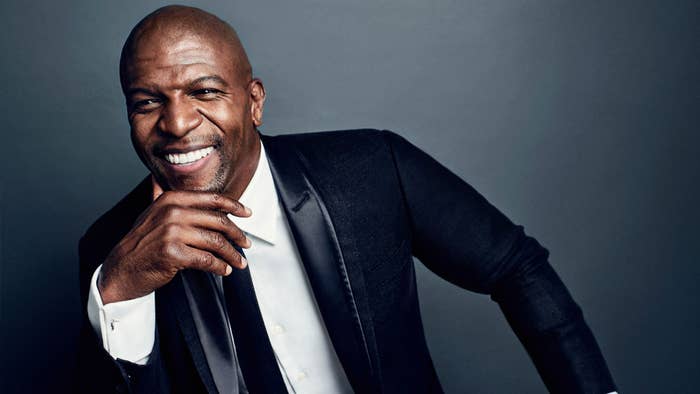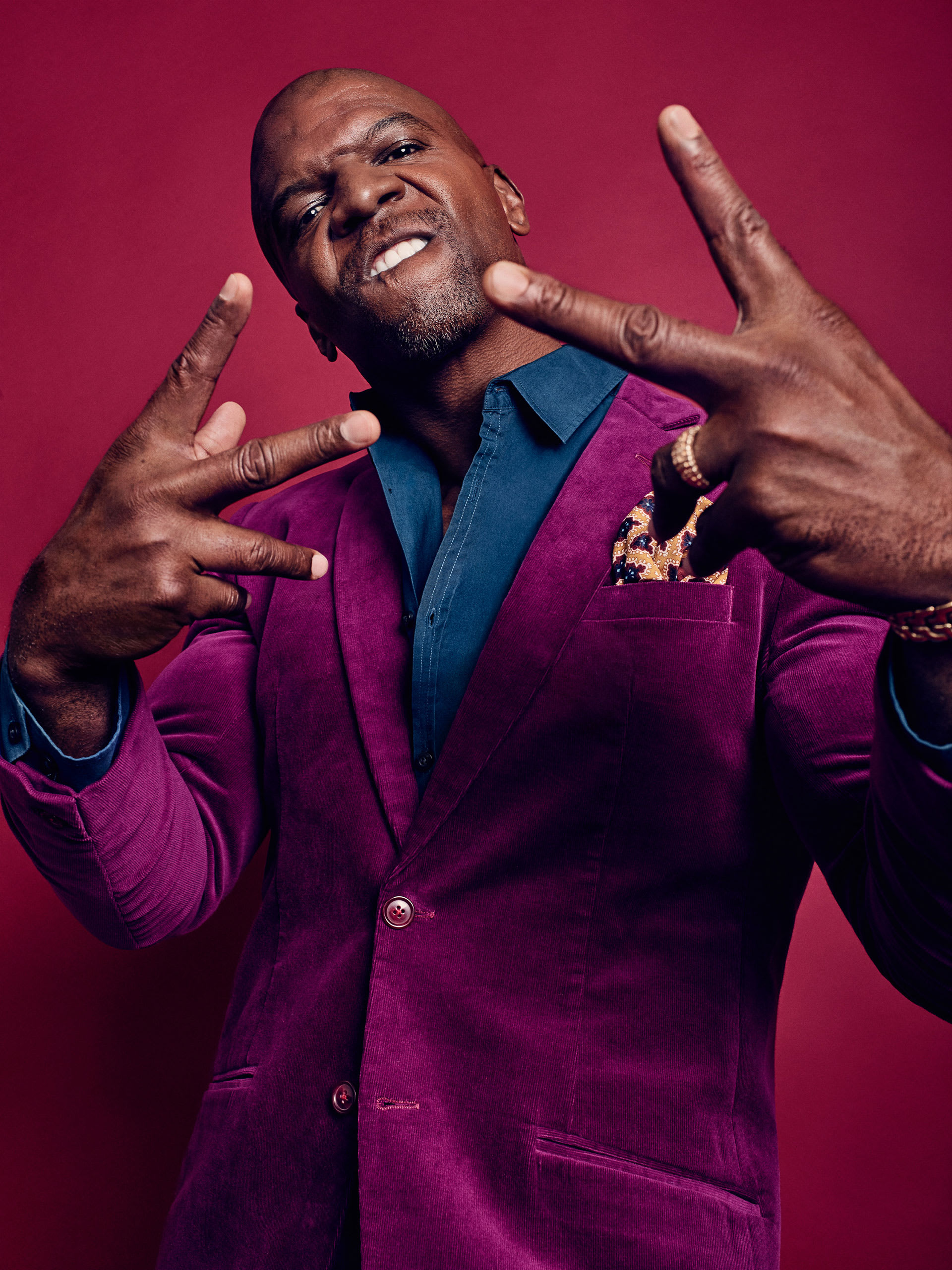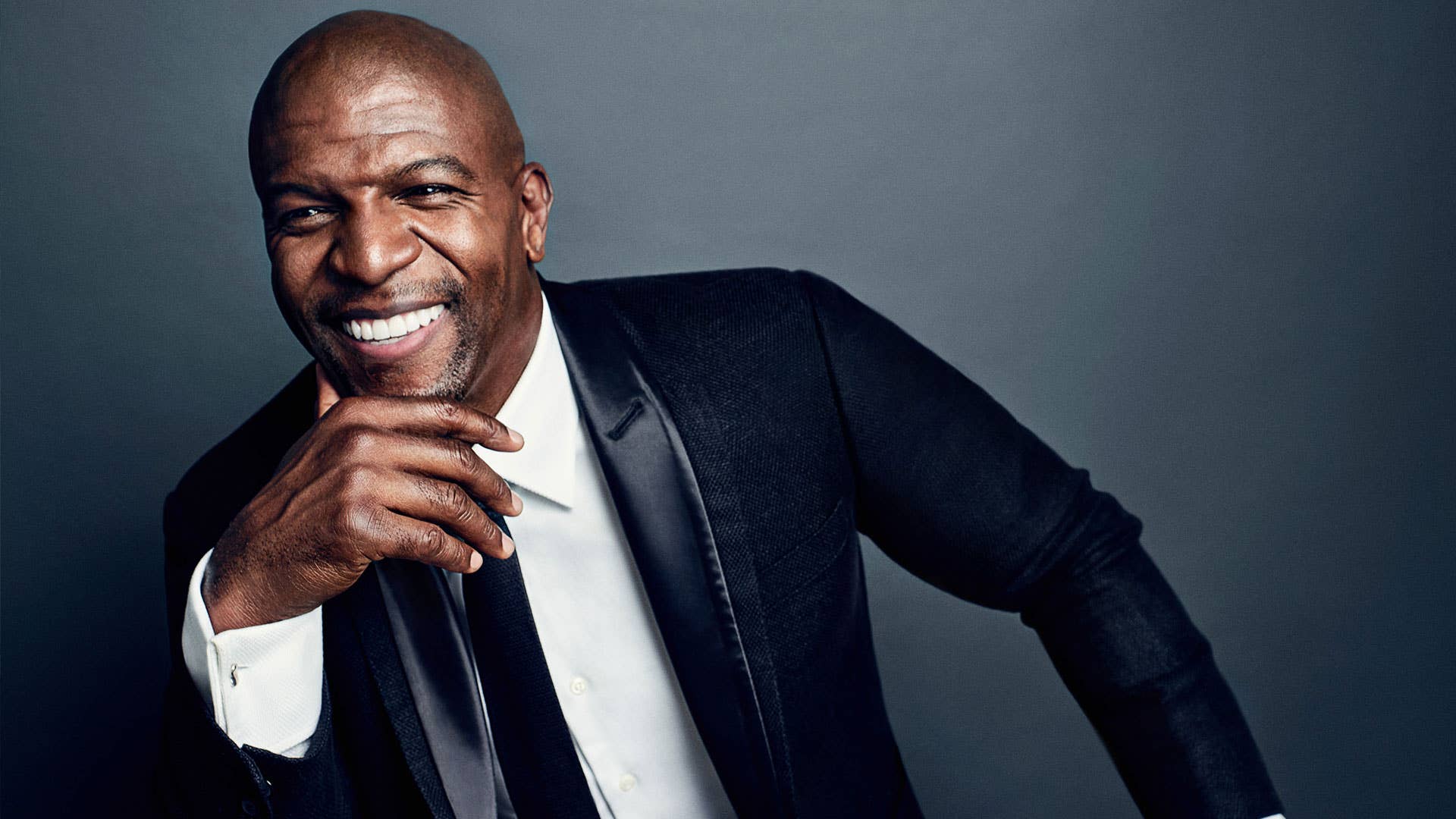
Long before he was a deodorant pitchman or syndicated talent show host or yogurt-obsessed lieutenant on Brooklyn Nine-Nine, Terry Crews was in Toronto. To be more specific, he was in the 6ix because that's where Platinum, the first TV series he ever acted in, was shot. He essentially played a hoodlum—and not even a funny one. You see, there was a time when Crews—he of knee-slapping hysterics and unflinching honesty—was hired to be nothing more than a mound of muscle. That, as you now know, didn't last long.
These days, Crews is something of an anti-man's man. The former NFL linebacker does his best to subvert mainstream ideas about masculinity every chance he gets, whether it's by speaking out about the damaging effects of pornography or giving vulnerable public testimonials about being an alleged sexual assault victim. On Brooklyn Nine-Nine, currently in its seventh season, he plays an enormous, muscular Ellen Degenerous. And when he occasionally slips up—as he did recently when he failed to support Gabrielle Union, who was ousted from America's Got Talent after she reportedly complained about the show's "toxic culture"—he's not too prideful to apologize for it.
But when I chat with Crews, we wind up talking a lot about his life before all that—when he was paid to play gangsters and wrestle people off of revolving cylindrical cages. (Just read on; you'll see.) Along the way, we also touch on toxic masculinity, the parallels between himself and Terry Jeffords, and his problems with modern hip-hop. Never a dull moment with this one.
(This interview has been edited and condensed for clarity.)
How you doin' Terry?
Alright! How you doin', man?
I'm okay! Just another cold night in Toronto.
I love Toronto. I don't go there as much as I want to, but I shot my first TV series there years ago. It was called Platinum.
Cool! What role did you play?
It was a gangster. It was kind of a... You know what it was? It was Empire, but ahead of its time. It was all about the music industry. It had Sticky Fingaz from Onyx on it and was way back in the day, like 2001. It was on the United Paramount Network, and man, I'm telling you, it was ahead of its time. I played the main heavy and there was this family and there was the music. And I'm thinking now, like, that was Empire! They stole that from Platinum! We did that a while back.
So you played a gangster. Was it a funny gangster?
No, I mean, that was when I first started acting and everybody was like, 'We're going to give you heavy stuff and make you a heavy.' My first role was in The 6th Day with Arnold Schwarzenegger. I wasn't doing comedy until Friday After Next. I had done Training Day and I was just an extra, basically. But I did security for Ice Cube while he was on Next Friday and I started doing a little comedy after that. Friday After Next was my biggest, funniest movie I was a part of at the time—I was still a heavy in that movie, but it kind of made me stand out like crazy. And then the comedy just kept going from there.
Was comedy what you really wanted to do from the start?
Let me say, I wasn't even trying to act! I was trying to get behind the scenes. I wanted to produce and write and create and do all this stuff. And a friend of mine invited me to an audition—the first thing I ever auditioned for. It was a TV show called Battle Dome. It was American Gladiators to the tenth power. I mean, we were putting people in the hospital, man. We did two years of that show.
Holy shit.
Yeah, it was before MMA. This was in 1999 and people had never seen blood on TV and we were like these warriors who were these wrestler-type guys. The contestants would come on and take us on in these challenges, but they were brutal. Really brutal. They'd get kicked in the head and all kinds of crazy stuff, man. We got major injuries. I got sued three times! People got injured. My character's name was T-Money. I was supposed to be this gangster from Detroit, and I had a posse and the whole thing, man.
But then what happened is they needed a heavy for this Schwarzenegger movie and I auditioned for that. And boom, I got that. I mean, before this I was doing bouncing and security and all this stuff. It told my wife, "You know, people say I should be an actor." She said, "Well, we don't have anything now. Let's try it." And damn, little did I know that was my calling, man. I was hooked.
But you've always been a naturally hilarious guy, right?
Always. I mean, first off, the locker room is the funniest place on earth, you know? Playing in NFL, we would always be cracking up. We were going at each other. You know, athletes are just human cartoons. They're so animated! So I had so many people to draw from that it was almost easy. It was just these personalities that were alpha. Some were big, some were preachers, some were drug dealers, and it was all in that football world. And so I pulled from that. I was always kind of the class clown, so I had no problem just going there.
"I love hip-hop. But the braggadocio, and the whole, 'You killed how many?' The whole thing just got colder and colder and became a caricature of itself, so people couldn't find their way back."
Not a lot of jacked dudes have an easy time poking fun at themselves. I see a lot of pretty self-serious swole-fies on Instagram.
I just take masculinity to its most extreme. Comedy tends to be a game of extremes, you know? That's what we did with the Old Spice commercials—we took masculinity to a point of craziness. You know, muscle and scream and big and arrgh! People loved it because they'd never seen it. You've got to understand that people with muscles have a lot of security issues. You know, the reason people worked out was so they wouldn't get picked on or talked about. But I didn't care. I'm like, "Go ahead, talk about it!" That's kind of the point for me. And it really set me apart.
Your character inBrooklyn Nine-Nine kind of subverts the masculine archetype too, right? He's a big, beefcakey guy who's a bit of a scaredy cat.
He's vulnerable. He has an issue with the fact that now he has kids and he could die. And he wants to be there for his daughters. You know, the myth is that we just go running into burning buildings. And that is such a myth, because there's a lot of fear. There's fear all over the place. In fact, when you look at what's going on right now, a lot of people are very, very afraid. And I think it's good to acknowledge it and deal with it and put it out there. My character on the show has really, really affected me. I mean, they pulled from my life in a lot of ways, because I had a lot of fears—you fear not being accepted, so you do a lot of things you don't even agree with, just so you can be accepted. But these fears control you; you have to keep the game going. And once you stop fearing, you really become free. It's a beautiful character. Terry Jeffords is probably one of the most developed characters on TV, because he's never just one note. You literally don't know how he's going to react.

I find the kid thing so relatable. I'm terrified of having kids. What if I can't keep them alive?!
Right?! They have me giving Jake advice on the show about kids. And you would think, being a father, that Terry would be encouraging. But Terry is like, "Don't have them!" [Laughs.] I love that. It's like, "No! Dude, it's too much. Don't even try!" That's how hard it is. It's almost like talking to your kids about getting into Hollywood—you almost want to discourage them. And if they beat that, then they are meant to be there, you know? So you should discourage people: "Don't have kids!" And if you have them anyway, that means you really want them. But it's nothing to fool around with. This is not a toy, you know what I mean? Like, your life is going to be done! You ain't gonna do nothing you wanna do! [Laughs.] That's the realest advice ever.
A bit earlier you were talking about having a lot of fears. What were you afraid of, man?
There was a time when I was worried about holding an image. Manhood in many ways is a cult. It's because you feel like you have to fit in; you spend a lot of time trying to be a part of it. And I realized that my salvation was when I left. That's when I stood out. And especially when you talk about cult stuff, it's literally like, you're in the group, and as soon as you start talking differently, you're a danger to the group. Even just by showing emotion and empathy, I would get looks, like, 'What's wrong with this dude?'And when I started talking about my issues with pornography, guys were like, "Dude, you busted the man code, because now you're telling our secret." And I got really, really ostracized for that. People called me all kinds of stuff; they were like, "You must be gay, there must be something wrong with him, he's mental." I basically lost my man card by being vulnerable and open.
Well man, you've come a long way from T-Money.
Dude, the biggest thing I see in that masculinity cult is the willingness to step on other people. It becomes a game of King of the Hill. And I've literally done it, physically. For real. I've been up on that hill and thrown people off it. [Laughs.] So I know what I'm talking about. The most competitive places in the world are professional sports and entertainment. The only other place is politics, and I haven't done that yet. But what's crazy to me is you're not even seen as a man unless you can pull that trigger or do the whole head stomp. It's almost like a gang initiation. They want to see if you can withhold all empathy and be cold. And if you can, you get to keep your card. Some of these guys are so insecure, because it's actually the weakest thing you've ever seen. They're pumping each other up to be something that they're not. I've seen it within the black community.
Just lots of alpha male posturing?
Yeah. You know, hip-hop itself started out pretty good and then it went into something else that was just, 'Huh?' I mean, I love hip-hop. But the braggadocio, and the whole, 'You killed how many?' The whole thing just got colder and colder and became a caricature of itself, so people couldn't find their way back. If you were even to show any sign of weakness, oh man, you'd get booed off the stage! It's almost as if a guy falls into a hole and he tries and tries, but he can't get out by himself because the walls are just too slick. And the only way you can get out of that is to get help. But you have to yell for help, and the masculinity credo is you don't yell for help. I've seen people die in the hole. A lot of that stuff is in your twenties when you're really, really trying to prove who you are and what you're about. But you do reach a point where you're old enough to realize you've got to walk your own path. You just have to be yourself, man.


